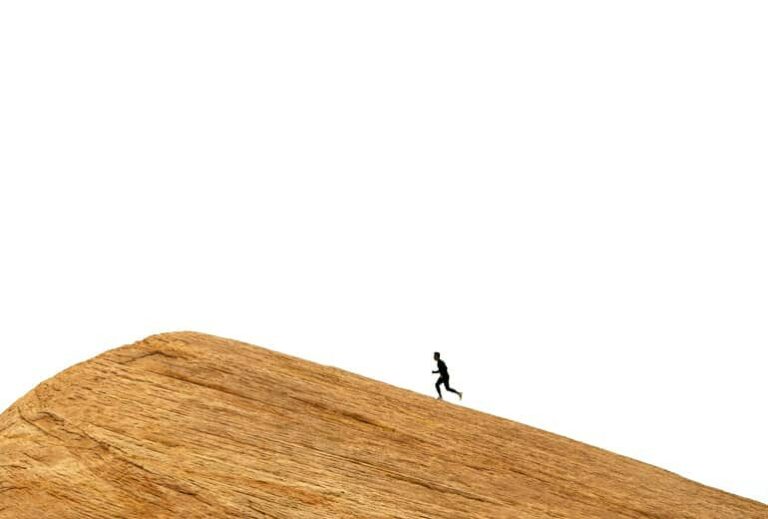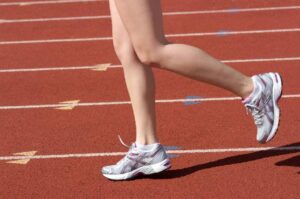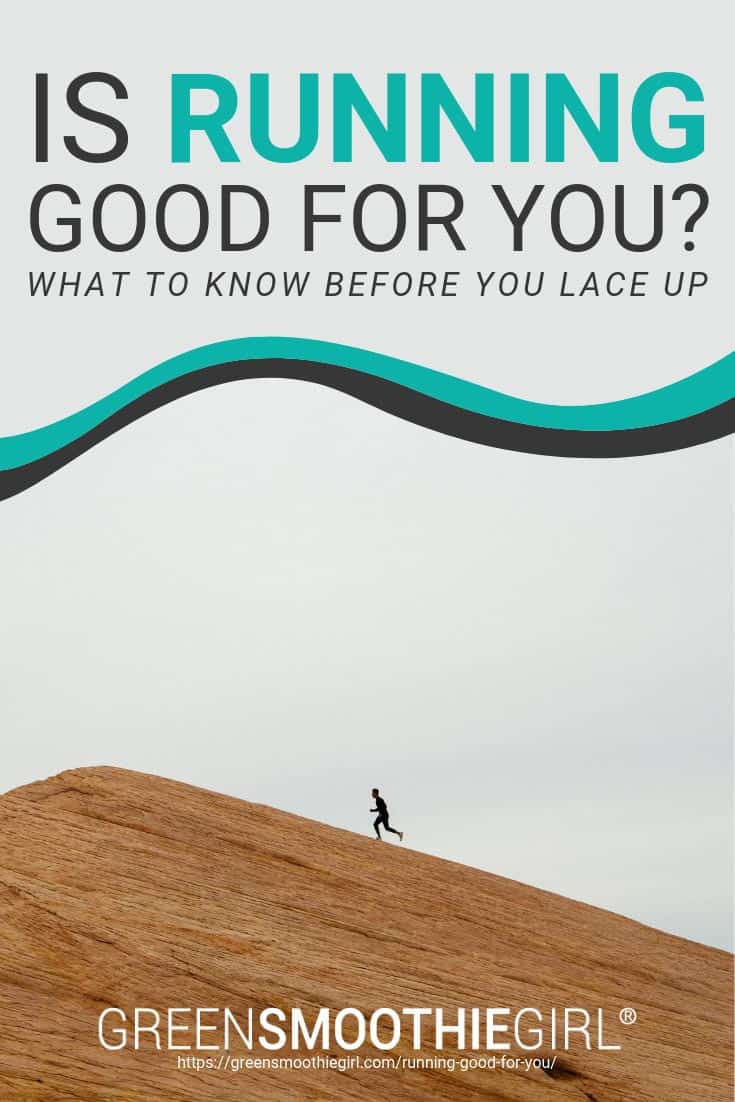Is Running Good for You? How About Marathons?

Are you a runner? If you are, it’s probably part of your identity – and if you’re not, you may be rolling your eyes.
Running is one of those polarizing activities that people seem to love or hate. The lovers wax poetic about “the runner’s high” or brag about their latest race time, while the haters grumble about shin splints or the sheer torture of trying to finish a mile.
In this post:
- WHAT ARE THE BENEFITS OF RUNNING?
- WHAT ARE THE RISKS OF RUNNING?
- WHAT ARE THE DANGERS OF DISTANCE RUNNING?
- HOW CAN I AVOID RUNNING INJURIES?
- MAKE RUNNING WORK FOR YOU
Even so, running seems to be more popular than ever, with charity 5Ks and themed marathons happening in cities across the country nearly every weekend. With so many people running these days, it begs the question: Is running good for you?
While research shows that, in general, running is good for you, it’s definitely not a one-size-fits-all workout solution. As with any activity, there are benefits and drawbacks to running – and like most things in life, more isn’t necessarily better. Running in moderation can be a great way to improve your overall health and well-being, but taking it to the extreme can undo much of your hard work.
Ultimately, the best way to decide if running is good for you is to get out there and do it! Sure, you can inform yourself about the benefits, understand the risks, and learn to take precautions to prevent injuries so you reap the biggest rewards – but eventually, you’ll have to grab your sneakers and hit the road.
Before you do, learn more about running and the best ways to add it to your exercise routine to improve your health.
WHAT ARE THE BENEFITS OF RUNNING?
Whether you’re an avid runner or you’re thinking about starting to run for better health, you’ve probably wondered if this activity is actually as good for you as some people claim.

Research shows running can add years to your life
Studies have shown that running is good for you – and the benefits of running extend to your body, your mind, and your quality and longevity of life. In fact, the research is overwhelming.
Here are some of the recent findings about the benefits of running:
- Amazingly, running can add as much as three years to your life.1 One study found that running for even just 5 or 10 minutes a day at slow speeds (less than six miles per hour) resulted in a three-year life expectancy benefit compared to non-runners.
- Runners have a substantially lower risk of death from all causes – including heart disease. The same study found that, compared with non-runners, runners had 30% less risk of all-cause death and 45% less risk of cardiovascular mortality.2
- Running has been shown to have a positive effect on mood.3 You’ve probably heard people talk about the endorphin rush or runner’s high they get during or after running, and it’s real. Research shows that running can elevate your mood, and it also has been shown to decrease anxiety.4
- Running can strengthen your bones. Running for short durations – around 30 minutes per day – can increase bone mineral density, calcium, and phosphorus.5 One study also found that running on a regular basis can reduce your risk of osteoarthritis and the chances that you’ll need a hip replacement.6
- Running can help you lose weight and become healthier. Over the course of a year, sedentary people who started running between six and 12 miles per week lost an average of seven pounds in body mass – along with nearly 3% body fat. They also had lower resting heart rates and lower triglycerides and HDL cholesterol levels. 7
- Running can help you manage diseases like high blood pressure. Running for just 20 minutes on a treadmill resulted in lower blood pressure seven hours later – even when participants spent the rest of the time doing sedentary activities.8
- Running reduces your risk of cancer. Research suggests that running triggers antioxidant activity and phase II enzymes, lowering your risk for lung cancer and liver cancer.9
With so much evidence – and continuously ongoing research – there’s no doubt about it: Running is good for you. Not only does running help you live a longer life, but it improves the quality of that life along the way.
WHAT ARE THE RISKS OF RUNNING?
Of course, running also comes with many risks – and those shouldn’t be overlooked.
The biggest risk that most runners face is that of getting injured. It’s estimated that between 37% and 56% of recreational runners get injured each year.10 These are people who run on a fairly regular basis and may participate in a long distance runs or races from time to time – but these are not people who race competitively or run marathons on a regular basis.
[Related: Red Light Therapy For Healing Injuries: Legit or Hype?]
It makes sense that the majority of running injuries happen to the legs, and knee injuries are the most common problems for runners. More than half (and as much as 75%) of running injuries happen from overuse, or the constant repetitive motion of running, but other factors that may cause running injuries include:11
- having a previous injury
- having little or no running experience
- running competitively
- running excessive distances on a weekly basis
Along with these factors, about 60% of running injuries can be chalked up to training errors.12 These can stem from:
- having poor strength or flexibility
- wearing inappropriate shoes for running
- running on new surfaces or on sidewalks
- overdoing it with increases in speed or distance
- biomechanical issues – like your gait or the way your foot strikes
Clearly, there’s a high risk of getting injured while running, but the good news is that many running injuries can be prevented with well-designed training programs, appropriate running shoes, and proper running technique.
WHAT ARE THE DANGERS OF DISTANCE RUNNING?
While it’s definitely possible to get injured running short distances (and many people do), the real danger seems to come from running longer distances – like marathons or even ultra-marathons. In fact, it’s estimated that as many as 90% of the people who train for marathons each year will sustain some kind of injury.13
The threshold seems to be around the 40 mile-per-week mark: People who run more than 40 miles per week put themselves at greater risk of injury.14 Knee injuries are still the most common, but one study15 found that running a marathon put men at increased risk of hamstring and calf problems, while women had higher risk of hip problems.
These long-distance runners not only increase their risk of injury, but they can also do lasting damage to their bodies.
- Research has shown that running for long durations (over 180 minutes in a day) can significantly decrease bone mineral density.16
- Running a marathon can damage the immune system. Researchers found that17 after marathon type exertion, our immune cells experience changes in number and function that can last for anywhere between three and 72 hours. This “immune dysfunction” window gives viruses and bacteria the opportunity to invade the body, increasing the risk for infection.

Running over 40 miles per week can cause lasting physical damage.
- Running long distances can result in exertional rhabdomyolysis18 – which is damage to the skeletal muscle cells. While this damage can usually repair itself, in some cases, muscle proteins can be released into the blood and can cause kidney failure.
- Excessive running can leave you mentally exhausted. After running ultra-marathons, runners show signs of psychological exhaustion and changes in stress hormones19 – regardless of how well they do in the race.
Of course, these are extreme examples of the dangers of running, and they generally apply to running that’s taken to the extreme. Running excessive distances, in very hot or cold climates, or on punishing terrain can push both the mind and the body to the breaking point. It makes sense that in extreme situations, one or the other will break.
[Related: Ouch! I Sprained My Ankle. My Drug Free Solution]
Many of the health issues associated with running long distances can be prevented or avoided by training properly and taking precautions (more on that in a minute). If you’re looking to test your strength or check off an item on your bucket list, running one marathon most likely won’t cause permanent damage to your body.
However, if you’re looking to maximize the health benefits of running, a more moderate program of 30 minutes, 3-4 times a week is probably your best bet.
HOW CAN I AVOID RUNNING INJURIES?
Many running injuries are preventable. Following a realistic and reasonable training program where you gradually increase your running intensity, learning how to run correctly, and buying shoes that are specifically designed to support and cushion your feet can all help to make sure you don’t get hurt while running – as can these tips for avoiding running injuries.
- TALK TO A PROFESSIONAL AND CREATE A TRAINING PROGRAM
One of the best things about running is that you really don’t need much to do it. In general, you can simply lace up a pair of running shoes and hit the road. That said, you should always consult your health care provider before starting any kind of athletic training program.
Research has shown that the amount of experience you have running is directly related to your risk of injury – and the more experienced you are, the lower your risk. If you’re not an experienced runner, you can lower your chances of getting hurt while running with a training program that gradually increases your running speed and intensity.20
While it might be tempting to push for that extra few miles or try to break a new pace, sudden increases in your running load or intensity are more likely to lead to injury, so follow your program and make moderate changes as your strength and ability improve.
- GET THE RIGHT RUNNING SHOES
Next, invest in a good pair of sneakers. Every foot is different; some roll slightly inward and some roll slightly outward with each step – and, of course, some strike fairly evenly with no rolling in either direction.
Depending upon how your foot strikes, you may need to invest in stability shoes that help to stabilize your foot as you run. Some runners also prefer cushioned running shoes to help absorb the shock of foot strike, potentially protecting their joints.
The best way to find out how your foot strikes is to visit a running store or athletic store, at least the first time you purchase running shoes. The fitters there can offer correct advice about the best shoes for individual feet, and which brands and styles to try on.
If you don’t have a specialty running or athletic store nearby, this video and guide by REI will show you how to look at wear patterns on your shoes to find out if your foot rolls one way or the other, and has great tips for choosing shoes on your own.
No matter which type of running shoe you choose, the general rule of thumb is that you should replace your running shoes every 300 to 500 miles.
- PERFECT YOUR RUNNING FORM
Make sure you’re running with proper form. You’ve probably seen runners on the street who trot along with their arms flailing or their wrists flopping – or who have their hands balled into tight little fists pulled in close to their chests.
To hold your hands correctly while you’re running, imagine holding a blade of grass between your thumb and your middle finger. That will give you a loose fist that swings easily – and arm swing is just as important a part of your running technique as your stride.
Your arms are meant to counteract the motion of your legs as you run, helping to propel you forward. It’s kind of like kicking your legs while you swim. You can find plenty of advice about correct running technique online (Runner’s World has a good overview, as does The Run Experience’s video), or at your local running club or athletic store.
- CONSIDER YOUR RUNNING GAIT
Your gait also affects your running technique, and your own personal biomechanics help to determine your gait.
Biomechanics are simply the way your muscles, joints, and tendons all work together as you run – and that can be affected by your strength, your flexibility, and any unique characteristics in your body. You can work with a running professional to help you find shoes that can counter any issues with your gait and to learn how to physically hold your body in ways that will help minimize the risk of running injuries.
Recent studies have shown that “minimalist running,” where runners aim for a softer strike of the forefoot and take quicker shorter strides, also may help to reduce injury,20 but you should talk with a professional to find out what will work best for you.
- STICK WITH THE RIGHT RUNNING SURFACE
While it might seem like a no-brainer, the surface on which you run can dramatically impact your risk for running injuries. Harder training surfaces have been associated with both “runner’s knee” and shin splints, and running on the sidewalk also increases your risk of injury.21

Your running surface can increase chances of injury.
Of course, other running surfaces pose the risk of injury, too, particularly when it comes to hills or loose terrain. However, the biggest running surface risk factor is actually running on any kind of new surface,22 whether that’s switching from a treadmill to a track or the sidewalk to sand.
To reduce the odds of getting hurt while running, run on the same surface consistently, and increase any time you spend on a new training surface in 10% increments.23
MAKE RUNNING WORK FOR YOU
At the end of the day, any type of exercise – including running – is only good for you if you actually do it.
If you don’t enjoy running, it isn’t the only activity you can perform that will deliver health benefits or enhance your mood. Find something you love to do and do it consistently, and you’ll do yourself more good than if your force yourself to run.
Running has many health benefits, and while there are risks, you can lower your chances of getting hurt while running by being smart about the way you run. As with any exercise, talk to your doctor about the best way to start a running program, and make sure you have the right equipment to start running – including shoes that will support and cushion your feet and a running surface that’s smooth, even, and comfortable.
While it’s fine to push yourself on occasion, remember to take it gradually when it comes to increases in your running speed or mileage – and that moderation is your friend. Then, lace up your sneakers, chase that runner’s high, and enjoy every stride toward better health and well-being.
Read Next: 14 Ways I Optimize My Health And Energy Every Day

Disclosure: This post may contain affiliate links that help support the GSG mission without costing you extra. I recommend only companies and products that I use myself.
SOURCES
(1)(2) Duck-chul Lee, Russell R. Pate, Carl J. Lavie, Xuemei Sui, Timothy S.Church, Steven N. Blair “Leisure-Time Running Reduces All-Cause and Cardiovascular Mortality Risk” Journal of the American College of Cardiology Aug 2014, 64 (5) 472-481;
(3) Dyer, J. B., & Crouch, J. G. (1988). Effects of Running and other Activities on Moods. Perceptual and Motor Skills, 67(1), 43–50.
(4)Wilson, V. E., Berger, B. G., & Bird, E. I. (1981). Effects of Running and of an Exercise Class on Anxiety. Perceptual and Motor Skills, 53(2), 472–474
(5) Yoshinobu Hagihara, Arata Nakajima, Satoshi Fukuda, Sumio Goto, Haruzo Iida, Masashi Yamazaki “Running Exercise for Short Duration Increases Bone Mineral Density of Loaded Long Bones in Young Growing Rats” The Tohoku Journal of Experimental Medicine 2009, 219:2 pgs 139-143
(6)Williams PT. Effects of running and walking on osteoarthritis and hip replacement risk. Med Sci Sports Exerc. 2013;45(7):1292-7.
(7)Hespanhol Junior, L.C., Pillay, J.D., van Mechelen, W. et al. Sports Med (2015) 45: 1455. https://doi.org/10.1007/s40279-015-0359-y
(8)Mota, Márcio R1,2; Pardono, Emerson1; Lima, Laila C J1; Arsa, Gisela1; Bottaro, Martim3; Campbell, Carmen S G1; Simões, Herbert G1 “Effects of Treadmill Running and Resistance Exercises on Lowering Blood Pressure During the Daily Work of Hypertensive Subjects” Journal of Strength and Conditioning Research: November 2009 - Volume 23 - Issue 8 - p 2331-2338
(9)Duncan, Karen et al. “Running exercise may reduce risk for lung and liver cancer by inducing activity of antioxidant and phase II enzymes” Cancer Letters Volume 116, Issue 2, 24 June 1997, Pages 151-158
(10)(11)van Mechelen, W. “Running Injuries: A review of the Epidemiological Literature” Sports Medicine (1992) 14: 320. https://doi.org/10.2165/00007256-199214050-00004
(12) McKenzie, D.C., Clement, D.B. & Taunton, “Running Shoes, Orthotics, and Injuries” J.E. Sports Medicine (1985) 2: 334
(13)(14)(20)Fredericson, M. & Misra, A.K. “Epidemiology and Aetiology of Marathon Running Injuries” Sports Med (2007) 37: 437
(15)Satterthwaite P, Norton R, Larmer P, et al Risk factors for injuries and other health problems sustained in a marathon. British Journal of Sports Medicine 1999;33:22-26.
(16) Yoshinobu Hagihara, Arata Nakajima, Satoshi Fukuda, Sumio Goto, Haruzo Iida, Masashi Yamazaki “Running Exercise for Short Duration Increases Bone Mineral Density of Loaded Long Bones in Young Growing Rats” The Tohoku Journal of Experimental Medicine 2009, 219:2 pgs 139-143
(17)Nieman, D.C. “Marathon Training and Immune Function.” Sports Med (2007) 37: 412.
https://link.springer.com/article/10.2165/00007256-200737040-00036#citeas
(18)Clarkson, P.M. “Exertional Rhabdomyolysis and Acute Renal Failure in Marathon Runners”
Sports Med (2007) 37: 361.
(19)Odagiri Y, Shimomitsu T, Iwane H, Katsumura T. Relationship between exhaustive mood state and changes in stress hormones following an ultraendurance race. Int J Sports Med. 1996; 17 325-331
(20)Rixe, Jeffrey A. BA1; Gallo, Robert A. MD2; Silvis, Matthew L. MD2,3“The Barefoot Debate: Can Minimalist Shoes Reduce Running-Related Injuries?” Current Sports Medicine Reports: May/June 2012 - Volume 11 - Issue 3 - p 160–165
(21)(22)(23)Preventing running injuries. Practical approach for family doctors. C A M Johnston, J E Taunton, D R Lloyd-Smith, D C McKenzie Canadian Family Physician Sep 2003, 49 (9) 1101-1109;
Posted in: Exercise, Lifestyle
















